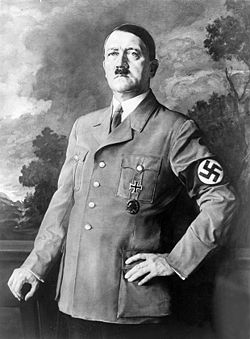User:Howard C. Berkowitz/AH/Lede
This article focuses on the personal actions and thoughts of Hitler himself. See National Socialism (or Nazi Party) for the development of the movement and eventually the government.
Adolf Hitler (1889-1945), the Nazi dictator of Germany (1933-45), was a dominant world figure before and during World War II. His authority was based on personality charisma rather than a strict ideology. [1] In other words, Nazi ideology was what Hitler believed. He gave overlapping responsibilities to subordinates, keeping them from growing too powerful and making him the ultimate authority. In particular, the same function could be assigned both to the government of the State and the Party. In Germany, this was complicated by the rise of the Schutzstaffel (SS), fanatically loyal to Hitler, as a state-within-a-state. The distinction between charismatic and ideological leadership of totalitarian regimes began roughly the in the mid-1970s, and later writers, such as Alan Bullock, continue to explore it; there has been a resurgence of interest in historical writing about Hitler, sometimes in comparison with other dictators.[2]
Hitler is explicable in principle, but that does not mean he has been explained. — Yehuda Bauer
As a youth, he felt he had a destiny, although originally as an artist. After failing to be admitted to art school, he went through a rootless period in Vienna, which probably first contributed to his obsessions about racial enemies; loosely, his ideas of a special Germanic race had developed along with his early love of Wagnerian and other heroic music. By the time he served in the First World War, bravely by many accounts, he had focused his hatred against the Jews. After World War I, his anger was increased by what was considered the "stab in the back" and the Treaty of Versailles.
It is unclear when he both began to think seriously about politics, but he certainly began speaking of politics during his time in Vienna (1907-1913). He began formal political activity in 1919, quickly discovered his ability as an orator, but did not really focus his political goals until the mid-1920s.
Writing neutrally and objectively about an individual, who caused some tens of millions of deaths, is challenging. This article does not attempt to suggest that Adolf Hitler was seen, by virtually anyone, as a nice man. Nevertheless, it is, in some important cases, possible to suggest why he made certain decisions. Other areas, such as his relationships, sexuality and its possible role in his actions, are necessarily far more speculative.
From a base in the Nazi Party, he maneuvered in various German coalitions, until the Nazis, through essentially democratic means, took control in 1933. They quickly moved to cut off democratic challenges, bloodily purge their internal opposition in the Night of the Long Knives, and increasingly emphasize their Nazi race and biological ideology as well as seeking Lebensraum, or room into which the racially pure could expand. Hitler was quite explicit, as well, in the essential role of individuals. As early as 1923, he had told an audience, "How are states founded? Through the personality of brilliant leaders and through a people that deserves to have the crown of laurel bound around its brow. Calling for boldness rather than democracy, he soon invoked volkisch symbols such as Siegfried and Frederick the Great, and often tying his argument back to the Jews and Communists. [3] It might be contrasted that Stalin gave relatively few public appearances, but worked extensively in Party politics, sometimes brutally, sometimes reported to have facilitated discussion among the leadership.
He became the dominant force in Europe and, after generally nonviolent occupations in Austria and Czechoslovakia, invaded Poland in 1939, as a violent example of the Drang nach Osten, the historical German demand for land in the East.[4] Poland started open war on the continent and spilling to Africa and the high seas. As well as foreign wars, he conducted The Holocaust within the areas under his powers, killing millions of Jews, Slavs, and others he considered undesirable. Eventually, an Allied coalition would force him back until he controlled but his bunker, where he committed suicide in 1945.
References
- ↑ Joseph Nyomarkay (1967), Charisma and Factionalism in the Nazi Party, University of Minnesota Press, p. 12
- ↑ Alan Bullock (1992), Hitler & Stalin: Parallel Lives, Alfred A. Knopf, ISBN 0-394-586-1-9
- ↑ G.M Gilbert (1950), The Psychology of Dictatorship, Ronald Press Company, p. 53
- ↑ Jerry Frank (2006), Drang nach Osten: The German Migration to the East
